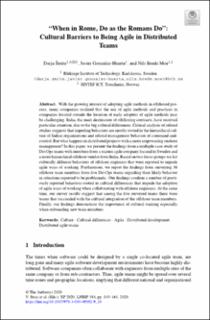| dc.contributor.author | Smite, Darja | |
| dc.contributor.author | Gonzalez-Huerta, Javier | |
| dc.contributor.author | Moe, Nils Brede | |
| dc.date.accessioned | 2022-05-05T08:14:00Z | |
| dc.date.available | 2022-05-05T08:14:00Z | |
| dc.date.created | 2020-11-16T23:12:50Z | |
| dc.date.issued | 2020 | |
| dc.identifier.citation | Agile Processes in Software Engineering and Extreme Programming: 21st International Conference on Agile Software Development, XP 2020, Copenhagen, Denmark, June 8–12, 2020, Proceedings. Lecture Notes in Business Information Processing. LNBIP, 383 145-161. | en_US |
| dc.identifier.issn | 1865-1348 | |
| dc.identifier.uri | https://hdl.handle.net/11250/2994295 | |
| dc.description.abstract | With the growing interest of adopting agile methods in offshored process, many companies realized that the use of agile methods and practices in companies located outside the location of early adopters of agile methods may be challenging. India, the main destination of offshoring contracts, have received particular attention, due to the big cultural differences. Critical analysis of related studies suggests that impeding behaviors are mostly rooted in the hierarchical culture of Indian organizations and related management behavior of command-and-control. But what happens in distributed projects with a more empowering onshore management? In this paper, we present the findings from a multiple-case study of DevOps teams with members from a mature agile company located in Sweden and a more hierarchical offshore vendor from India. Based on two focus groups we list culturally different behaviors of offshore engineers that were reported to impede agile ways of working. Furthermore, we report the findings from surveying 36 offshore team members from five DevOps teams regarding their likely behavior in situations reported to be problematic. Our findings confirm a number of previously reported behaviors rooted in cultural differences that impede the adoption of agile ways of working when collaborating with offshore engineers. At the same time, our survey results suggest that among the five surveyed teams there were teams that succeeded with the cultural integration of the offshore team members. Finally, our findings demonstrate the importance of cultural training especially when onboarding new team members. | en_US |
| dc.language.iso | eng | en_US |
| dc.publisher | Springer | en_US |
| dc.relation.uri | https://link.springer.com/chapter/10.1007/978-3-030-49392-9_10#citeas | |
| dc.rights | Navngivelse 4.0 Internasjonal | * |
| dc.rights.uri | http://creativecommons.org/licenses/by/4.0/deed.no | * |
| dc.subject | Culture | en_US |
| dc.subject | Cultural differences | en_US |
| dc.subject | Agile | en_US |
| dc.subject | Distributed development | en_US |
| dc.subject | Distributed agile teams | en_US |
| dc.title | "When in Rome, Do as the Romans Do": Cultural Barriers to Being Agile in Distributed Teams | en_US |
| dc.title.alternative | "When in Rome, Do as the Romans Do": Cultural Barriers to Being Agile in Distributed Teams | en_US |
| dc.type | Peer reviewed | en_US |
| dc.type | Journal article | en_US |
| dc.description.version | publishedVersion | en_US |
| dc.rights.holder | © The Author(s) 2020 | en_US |
| dc.source.pagenumber | 145-161 | en_US |
| dc.source.volume | LNBIP, 383 | en_US |
| dc.source.journal | Lecture Notes in Business Information Processing | en_US |
| dc.identifier.doi | 10.1007/978-3-030-49392-9_10 | |
| dc.identifier.cristin | 1848571 | |
| dc.relation.project | Norges forskningsråd: 267704 | en_US |
| cristin.ispublished | true | |
| cristin.fulltext | original | |
| cristin.fulltext | original | |
| cristin.qualitycode | 1 | |

